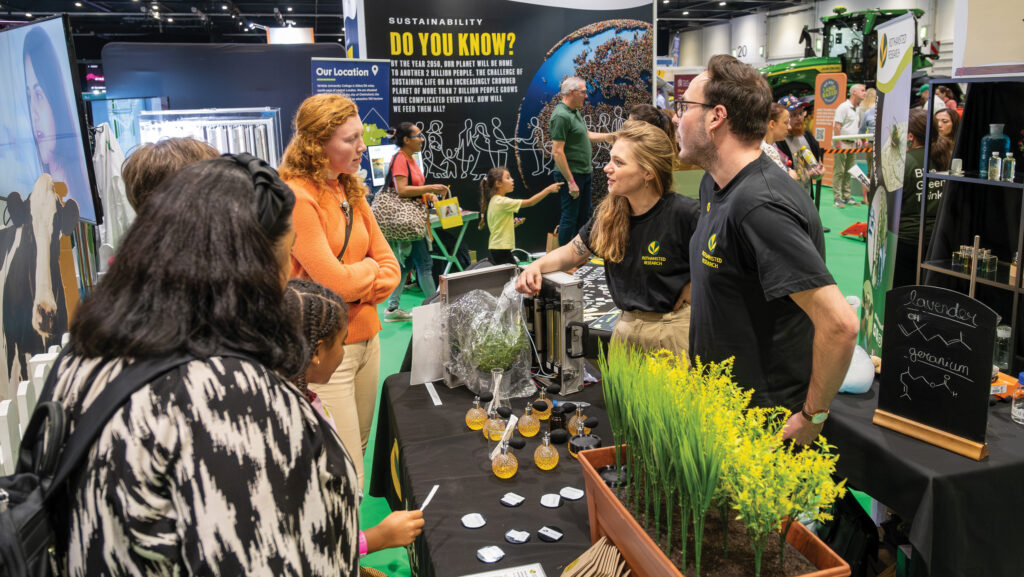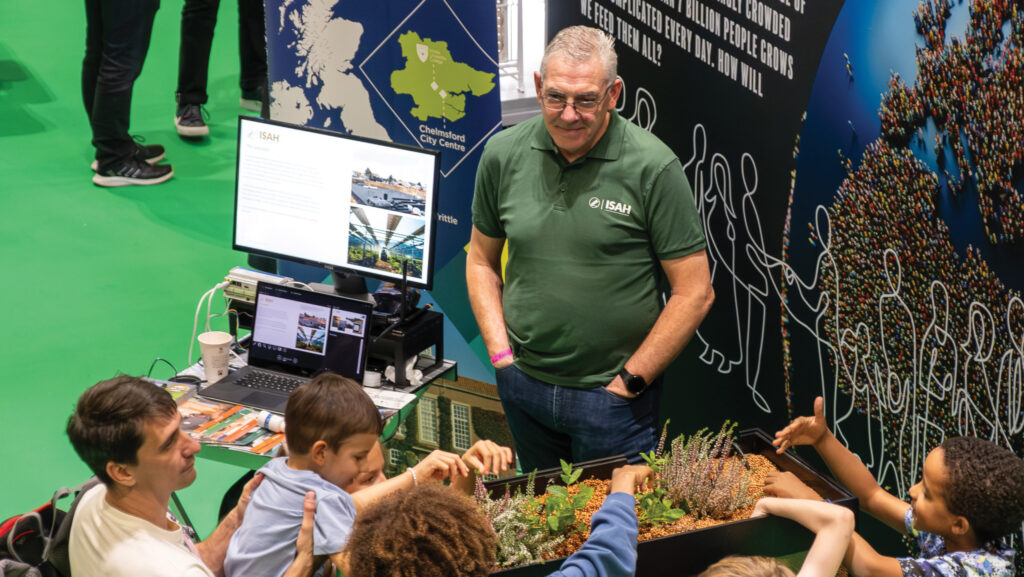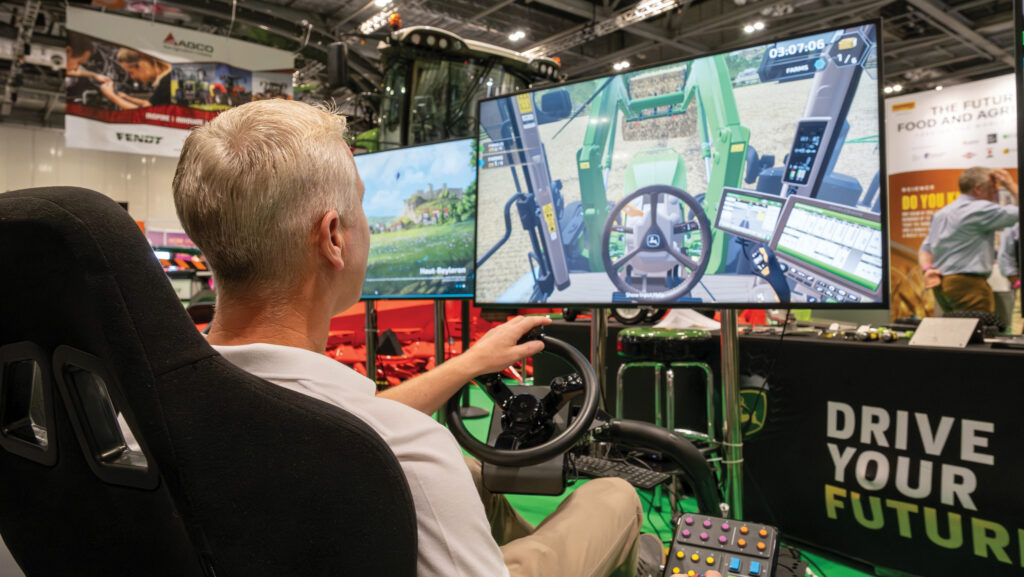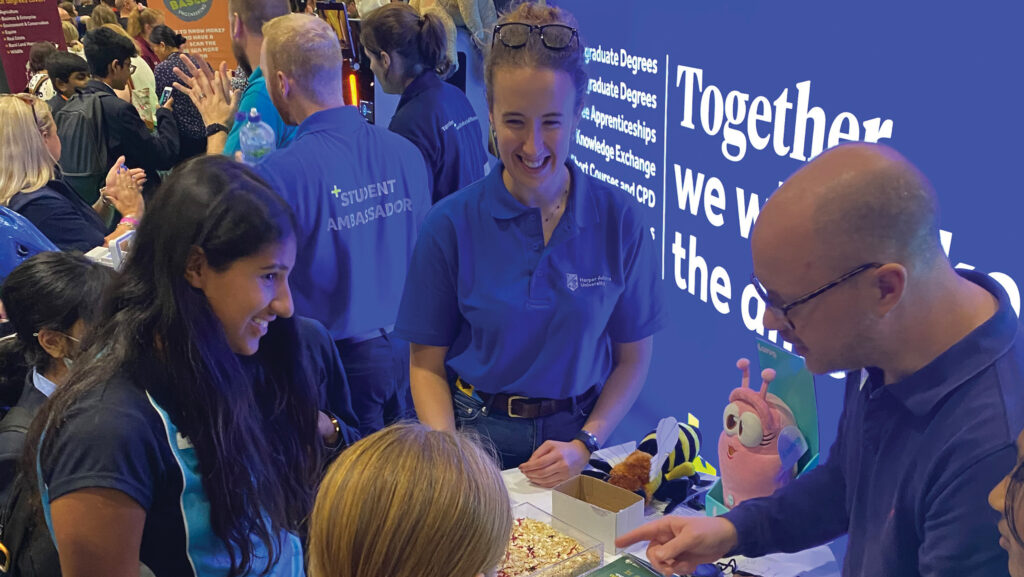Ag careers are star of the show at New Scientist Live 2024
 © Rothamsted Research
© Rothamsted Research Farmers Weekly’s Future of Food & Agriculture exhibit will return to New Scientist Live next month, showcasing ag technology to a non-farming audience for the sixth year running.
Together with our partners, we’ll be championing careers in the industry, demonstrating how the future of precision farming can lead to more sustainable practices.
“With an ever growing population to feed it is increasingly important that we attract new blood into the agri-food sector,” says Harper Adams University’s head of student recruitment, Carl Mansell-Griffiths.
See also: Video – Farmers Weekly showcases agriculture at New Scientist Live
About New Scientist Live
The world’s biggest festival of science and technology runs from 12-14 October at ExCeL, London.
New Scientist Live attracts thousands of people every year including career-minded science, technology, engineering and maths (Stem) students.
Over the three days, visitors can get hands-on with more than 80 exhibits on the show floor and be inspired by thought-provoking talks from over 70 speakers across five stages.
Find out more at live.newscientist.com.
The Future of Food & Agriculture exhibit aims to dispel common misconceptions among the public that farming is a slow-moving and low-skilled sector, and inspire young scientists and innovators to consider working in the sector.
“We want to highlight how agriculture intersects with fields like robotics, data science, and environmental sustainability,” says Ruthie Peterson, careers manager at the Institute of Agriculture and Horticulture.
Everyone is talking about how AI will transform our lives – and farming is no exception, adds Rothamsted Research’s director of communications and engagement, James Clarke.
“It will herald in a new era of ultra-precise agriculture, bio-engineered super-crops and farms optimally managed for both food and the environment.”
Being at New Scientist Live helps bring future generations more of an appreciation for our countryside and all that it provides, says Kuhn’s Edd Fanshawe.
“Agriculture is important to our everyday living. It provides us with food and drink, but it also provides us with clothing, household products and medicine.”

© Dan Corns/thirdlensfilms.com
Pulling power
Every year at New Scientist Live, queues form for the chance to sit in a technology-packed John Deere tractor; this time it will be the 6R, with a Kuhn drill attached.
After getting a taste of the real thing, there is the opportunity to drive a John Deere virtually using Farming Simulator and have a go at the Bale Stacking competition.
Show-goers will be able to learn more about the sophisticated engineering that underpins the most technically advance farm machines on the planet, and test their skills in the AEA’s build-a-tractor challenge.
Meanwhile, Garford will also be demonstrating precision kit in the form of its Robocrop Guided 3 Row InRow Weeder, showing visitors how it reduces the use of chemicals by targeting the weeds more precisely.

© Dan Corns/thirdlensfilms.com
Sustainable soils
“Most people will never have given a second thought to the brown stuff under their feet but soil is one of the most vital natural resources we have on planet Earth,” says Linking Environment and Farming director Carl Edwards.
A teaspoon of soil contains more micro-organisms than there are people in the world, and we only know and understand the purpose of a small percentage of these, says Carl.
“On the Leaf stand we’ll explore the friends and foes of soil micro-organisms – and why the work of farmers to improve soil health is critical to the food we all eat.”
Tech that’s tackling costly crop pests is on the agenda for Harper Adams.
Grey field slugs are arable farming’s biggest pest threat, costing tens of millions of pounds a year; predicting where slugs will gather could result in massive boosts environmentally and economically by helping reduce farmers’ reliance on slug pellets.
KWS will be highlighting the journey from seed to product, encompassing many areas of the agricultural industry in the process.
The variety quiz asks people to match major food crops to their seeds, and to the everyday products found in local shops.

© Harper Adams University
Animal health and welfare
The role of wearable tech in transforming livestock management will be explained to show-goers, who can discover the science behind calving sensors and heat collars, and how they help enhance animal welfare and farm efficiency by reducing stress.
They can also delve into the science behind the Livestock Scanner, which provides real-time insights into animal health and gestation.
By using advanced imaging techniques, the scanner helps farmers make informed decisions, improving herd welfare and productivity.
How can post-mortems help save the lives of animals?
That is the question Harper Adams veterinary experts will be answering with the help of model organs of a cow.
People can try their hands at animal pathology and help diagnose illnesses by conducting diagnostic tests.
Newcastle University will be carrying out cattle gait and grazing demonstrations, and people will be able to wear the sensors themselves to receive their own gait analysis.
The technology – also used to assess people for hip operations and for arthritis research in dogs – has been adapted to work with CCTV cameras to pick up lameness issues in herds.
Also on show…
- Rothamsted scientists will be discussing the issue of methane emissions in cattle with the help of their famous Burpometer.
- Spuds will be in the spotlight, courtesy of Newcastle University. Visitors can test their knowledge of the humble potato and hear about current research to improve their nutritional value and help them cope with global warming. The university will also be asking if crops are better grown indoors or out, and explaining how the LEDs in vertical farming can affect the flavour of plants.
- Land-based training provider Lantra will showcase the variety of qualified training opportunities for people entering the agricultural industry, with insights on hypodermic needles and vaccinations, plus a VR vision of the future of farming.
- The irrigation solar attenuation harvest water-saving (Isah) technology – which captures rainwater in underground attenuation tanks for use as irrigation or as a flood alleviation – will be demonstrated by a scaled-down cross-section of a cropped field. Simply move a sensor to start the water pump and watch as the cloud monitoring records the moisture levels.
- KWS will have a DNA extraction experiment revealing the code that gives a strawberry its unique appearance, smell and taste.
The Future of Food & Agriculture: Feeding the world sustainably – meet the team
Farmers Weekly is working with these organisations to bring the Future of Food & Agriculture exhibit to New Scientist Live.


Partners
Harper Adams University is our lead education partner

